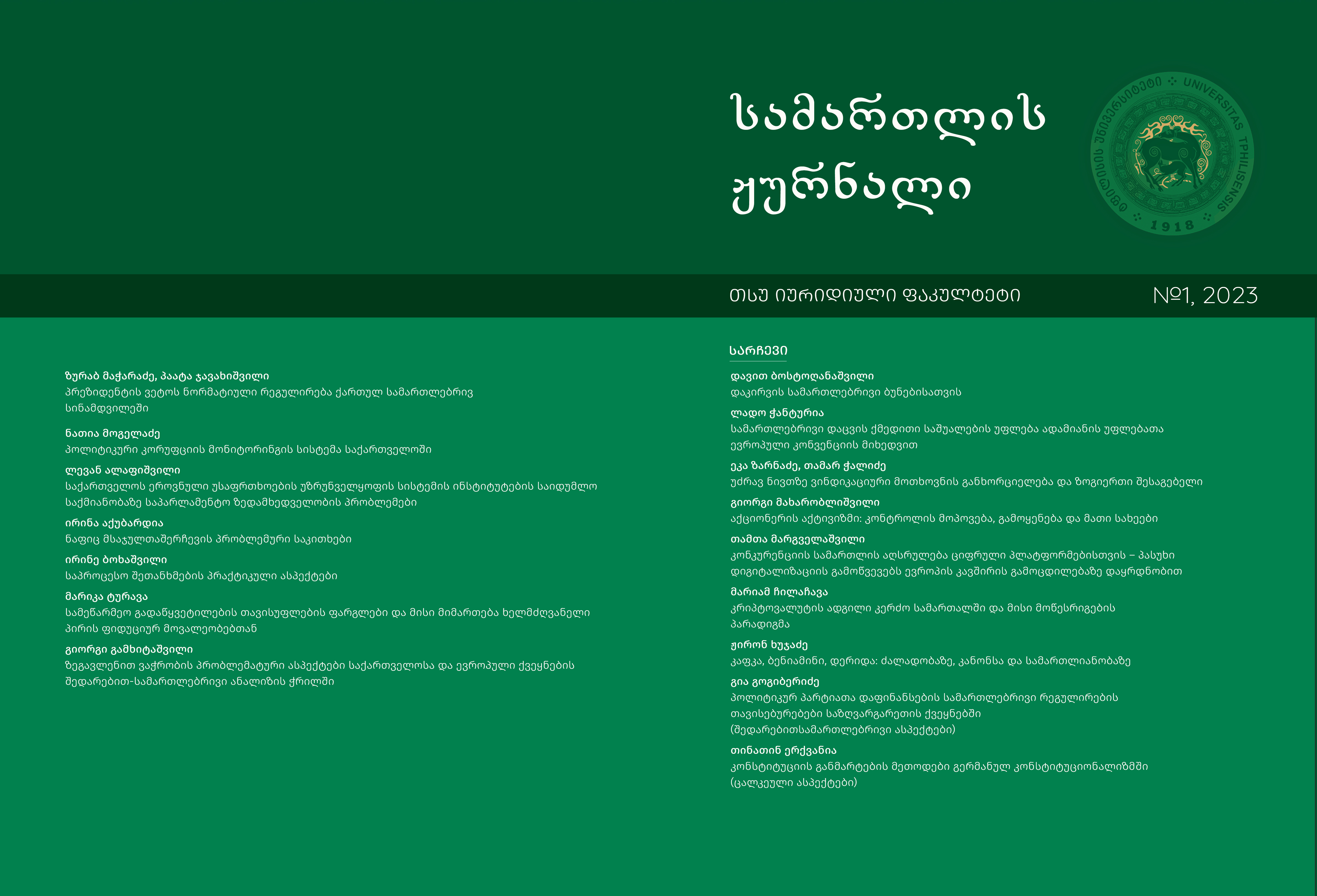საპროცესო შეთანხმების პრაქტიკული ასპექტები
DOI:
https://doi.org/10.60131/jlaw.1.2023.7072საკვანძო სიტყვები:
საპროცესო შეთანხმება; აღიარება; სამართლიანი სასამართლო; მტკიცების სტანდარტი; გასაჩივრება.ანოტაცია
თანამედროვე მოლაპარაკებების სამყაროში სულ უფრო აქტუალურია საუბარი სისხლის სამართლის პროცესში საპროცესო შეთანხმების, როგორც სწრაფი მართლმსაჯულების სრულყოფისა და განახლების შესახებ.
წარმოდგენილი ნაშრომის მიზანია საპროცესო შეთანხმების ძირითადი არსებითი ნიშნების განხილვა და გაანალიზება მოქმედი კანონმდებლობის, არსებული შიდა სასამართლო პრაქტიკის, ევროპული სასამართლოს მიდგომების და საზღვარგარეთის ქვეყნების (უმეტესად, აშშ) გამოცდილების საფუძველზე, რაც ხელს შეუწყობს რელევანტური დასკვნების შედეგად საკანონმდებლო თუ პრაქტიკული სრულყოფის წინადადებების შემუშავებას.
ნაშრომში საუბარია ისეთ აქტუალურ საკითხებზე, როგორებიცაა: ბრალდებულის აღიარება, როგორც საპროცესო შეთანხმების საგანი და საფუძველი და მის სანაცვლოდ მიღებული სარგებელის თანაფარდობა; საპროცესო შეთანხმებაში მონაწილე მხარეები და მათი შედარებითი ანალიზი პროცესის მხარის ცნებასთან; შუამდგომლობა საპროცესო შეთანხმების დამტკიცების შესახებ, როგორც საქმის არსებითი განხილვის გარეშე გამამტყუნებელი განაჩენის დადგენის მთავარი ფორმალური საფუძველი; ე.წ. „საპროცესო შეთანხმების“ სტანდარტის ადგილი და როლი მტკიცების სტანდარტების სისტემაში; საქართველოს სისხლის სამართლის კოდექსის 55-ე მუხლით გათვალისწინებული საგამონაკლისო წესი და მოსამართლის დამოუკიდებლობის საკითხი სასჯელის სახისა და ზომის შერჩევა/დანიშვნის დროს; საპროცესო შეთანხმების დამტკიცების შესახებ შუამდგომლობის განხილვა და შედეგების გასაჩივრების თავისებურებანი (საკანონმდებლო და სასამართლო პრაქტიკის აქტუალური საკითხები).
დასკვნის სახით ნაშრომის დასასრულს შემოთავაზებულია ავტორისეული ნააზრევი ძირითად პრობლემურ ასპექტებზე და შეჯამების სახით აღნიშნულია, რომ: მიმდინარე ეტაპზე არ უნდა იყოს მიზანშეწონილი სასჯელის დანიშვნისას მოსამართლის კომპეტენციის გაზრდის მიმართულებით ცვლილებების უშუალოდ საქართველოს სისხლის სამართლის საპროცესო კოდექსის საპროცესო შეთანხმების დებულებების თავში შეტანა; მიზანშეწონილია საკანონმდებლო რეგულაციის განმარტების და სასამართლო პრაქტიკის იმ მიმართულებით განვითარება, რომ გამამტყუნებელი განაჩენის დადგენის ერთიანი სტანდარტი განისაზღვროს და ეს იყოს მხოლოდ გონივრული ეჭვის მიღმა სტანდარტი; მიზანშეწონილია საკანონმდებლო რეგულაციების დახვეწა და ახალი სასამართლო პრაქტიკის ჩამოყალიბება საპროცესო შეთანხმების დამტკიცების შესახებ განაჩენის პროკურორის მიერ გასაჩივრების მიმართულებით და შემოთავაზებულია რეკომენდაცია, რომ ასეთი შემთხვევა განიხილებოდეს, როგორც ახლადგამოვლენილი გარემოების გამო განაჩენის გადასინჯვა და პროკურორი შუამდგომლობის საფუძველზე ახდენდეს აღნიშნული კომპეტენციის რეალიზებას.
წყაროები
Criminal Procedure Code of Georgia, Legislative Herald of Georgia, 09/10/2009.
Law of Georgia "Juvenile Justice Code", Legislative Herald of Georgia, 12/06/2015.
Criminal Code of Georgia, Legislative Herald of Georgia, 22/07/1999.
Federal Rules of Criminal Procedure, Title IV: Arraignment and Preparation for Trial, Rule 11 Rule 11. Pleas | Federal Rules of Criminal Procedure | US Law | LII / Legal Information Institute, https://www.law.cornell.edu/rules/frcrmp/rule_11 [23.05.2023].
Activity Report of the Prosecutor's Office of Georgia 2021, 21, (in Georgian), Microsoft Word - ad7e-f55d-3189-23ba.docx (pog.gov.ge) [23.05.2023].
Alge D., Negotiated Plea Agreements in Cases of Serious and Complex Fraud in England and Wales: A New Conceptualisation of Plea Bargaining?", Vo. 19, No.1, 2013, 1-18.
Bartels L., Wren E., “Guilty Your Honor”: Recent Legislative Developments on the Guilty Plea Discount and an Australian Capital Territory Case Study on it’s Operation, Adelaide Law Review, 2014, 361-384.
Chomakhashvili K., Legal Aid in Plea Bargaining. Overview of Georgian Legislation and Practice, UNDP, 2018 UNDP_GE_DG_Legal-Aid-in-Plea-Bargaining---Georgian-Legislation-and-Practice-Eng.pdf [23.05.2023].
Coalition for Independent and Transparent Justice. The report of criminal justice working group, the use of plea agreements in Georgia, 2013, 19-21 Use of Plea Agreements in Georgia (coalition.ge) (in Georgian) [23.05.2023].
Coercive Plea Bargaining, Policy Forum, Cato Institute, 2018, October https://www.cato.org/events/coercive-plea-bargaining
Chomakhashvili K., Legal Aid in Plea Bargaining. Overview of Georgian Legislation and Practice, UNDP, 2018.
Dan-Cohen M., Article: Decision Rules and Conduct Rules: On Acoustic Separation in Criminal Law, Vol. 97, Harv. L. Rev. 625, January, 1984.
Ellis A., Bussert T., Stemming the Tide of Postconviction Waivers, Published in Criminal Justice, Vol. 25, Number 1, 2010, American Bar Association.
Fisher T., The Boundaries of Plea Bargaining: Negotiating the Standard of Proof, Vol. 97, Issue 4, J. Crim. L. & Criminology 943, 2006-2007.
Fountain E., Adolescent Plea Bargains: Developmental and Contextual Influences of Plea Bargain Decision Making, Washington, D.C., Georgetown University, 2017.
Giorgadze G. (ed.), Commentary on the Criminal Procedure Code of Georgia, Tbilisi, 2015, 642, 645 (in Georgian).
Judgments issued by the European Court of Human Rights against Georgia (2005-2019), collection, Georgian Bar Association, 65-67, https://gba.ge/pdf/5fc637491ddeb.pdf/Final%20-%20ECtHR.pdf [23.05.2023].
Laliashvili T., Problems of the Plea Agreement in Relation to the Main Principles of the Criminal Process, In the textbook: The Impact of European and International Law on Georgian Criminal Procedural Law, Tumanishvili G., Jishkariani B., Shrami E. (eds.), Pubishing House „Meridian“, Tbilisi, 2019, 363-379, (in Georgian).
Mezzetti C., Baker S., Prosecutorial Resources, Plea Bargaining and the Decision to Go to Trial, Journal of Law Economics and Organization, 2001, Vol.17. No.1.
Langer M., From Legal Transplants to Legal Translations: The Globalization of Plea Bargaining and the Americanization Thesis in Criminal Procedure, Harvard International Law Journal, 45(1), 2004.
Neily C., Overcriminalization and Plea Bargaining Make Criminal Justice Like Shooting Fish in a Barrel, Cato Unbound, A Journal of Debate, July, 2020.
Okhanashvili A., Surmava B., Georgian Model of a Plea Agreement in Light of the Secision of the European Court of Human Rights: the case of Natsvlishvili and Togonidze against Georgia #9043/05, German-Georgian Journal of Criminal Law, 2021, #1 (in Georgian).
Paciocco P., Seeking Justice by Plea: The Prosecutor’s Ethical Obligations During Plea Bargaining, McGill Law Journal, 2018 CanLIIDocs 324, 45.
Redlich A.D., Summers A., Voluntary, Knowing, and Intelligent Pleas: Understanding the Plea Inquiry, Psychology Public Policy and Law, 18(4), 2011.
Report of the Chief Prosecutor of Georgia, 2018, Report of the Chief Prosecutor of Georgia, 14 (in Georgian) Multimedia/Files/ანგარიში/მთავარი პროკურორის ანგარიში 6.02.2018.pdf (pc.gov.ge) [23.05.2023].
Roberts J., Effective Plea Bargaining Councel, The Yale Law Journal, 2013, 2650-2674.
Thomas Ph.A., Plea Bargaining in England, 69 J. Crim. L. & Criminology, 1978, 170-178;
Tinsley A., Criminal Legal Aid and Plea-Bargaining (Overview of International Standards and Recommendations for Georgian Legal Aid), UNDP, 2017, 11-17.
Turava M., Criminal Law, Overview of the General part, 9th ed., Meridiani, Tbilisi, 2013, 362.
Turner J.L., Plea Bargaining and Disclosure in Germany and the United States: Comparative Lessons, Plea Bargaining Regulation: The Next Criminal Procedure Frontier Symposium, William and Mary Law Review, Vol. 57, Issue 4, 2016, 1549-1596.
Transparency International - Georgia, Report: Plea Bargaining in Georgia, 2010, 36 Plea Bargaining in Georgia - Negotiated Justice - GEO (2).pdf (transparency.ge) [23.05.2023].
Transparency International Georgia, Research: Plea Bargaining in Georgia, 2010, 15, 21 (in Georgian).
Tskitishvili T., Separate Aspects of Regulating the Issues of Substantive Criminal Law Issues of Juvenile Justice, TSU Journal of Law, 2019, #1, 190-221 (in Georgian).
Tsur Y., Bounding Reasonable Doubt: Implications for Plea Bargaining, The Hebrew University of Jerusalem, September, 2016.
Vardzelashvili I., Some Issues of Sentencing (Analysis of Judicial Practice), SEU, Tbilisi, 2020, 13, (in Georgian).
Wolfson R. (ed.), American Bar Association Rule of Law Initiative (ABA/ROLI), A Guide for Lawyers in a Plea Agreement and Negotiation Skills, Author Group, Meridian, Tbilisi, 2013, 128-133 (in Georgian).
Judgment of the Chamber for criminal cases the Tbilisi Court of Appeal of June 25, 2013, case # 1/b155-13.
Judgment of Mtskheta District Court of June 27, 2016 on criminal case #1/156-16.
Ruling of the Chamber for criminal cases of the Supreme Court of Georgia of December 10, 2018 (Case #416AP-18), 58-64.
Verdict of the Chamber for criminal cases of the Supreme Court of Georgia of November 29, 2018, case #301 -18, 43-58.
Verdict of the Bolnisi District Court of April 15, 2020, case #N 1/110-20.
Natsvlishvili and Togonidze v. Georgia, [2014], (C) NATSVLISHVILI AND TOGONIDZE v. GEORGIA (coe.int) (in Georgian) [23.05.2023].
Kadagishvili v. Georgia [2020] (in Georgian) kadagishvili-saqartvelos-winaagmdeg.pdf (supremecourt.ge) [23.05.2023].
Scopolla v. Italy (No.2) [2009] ECHR, 135.
ჩამოტვირთვები
გამოქვეყნებული
როგორ უნდა ციტირება
გამოცემა
სექცია
ლიცენზია

ეს ნამუშევარი ლიცენზირებულია Creative Commons Attribution-ShareAlike 4.0 საერთაშორისო ლიცენზიით .









